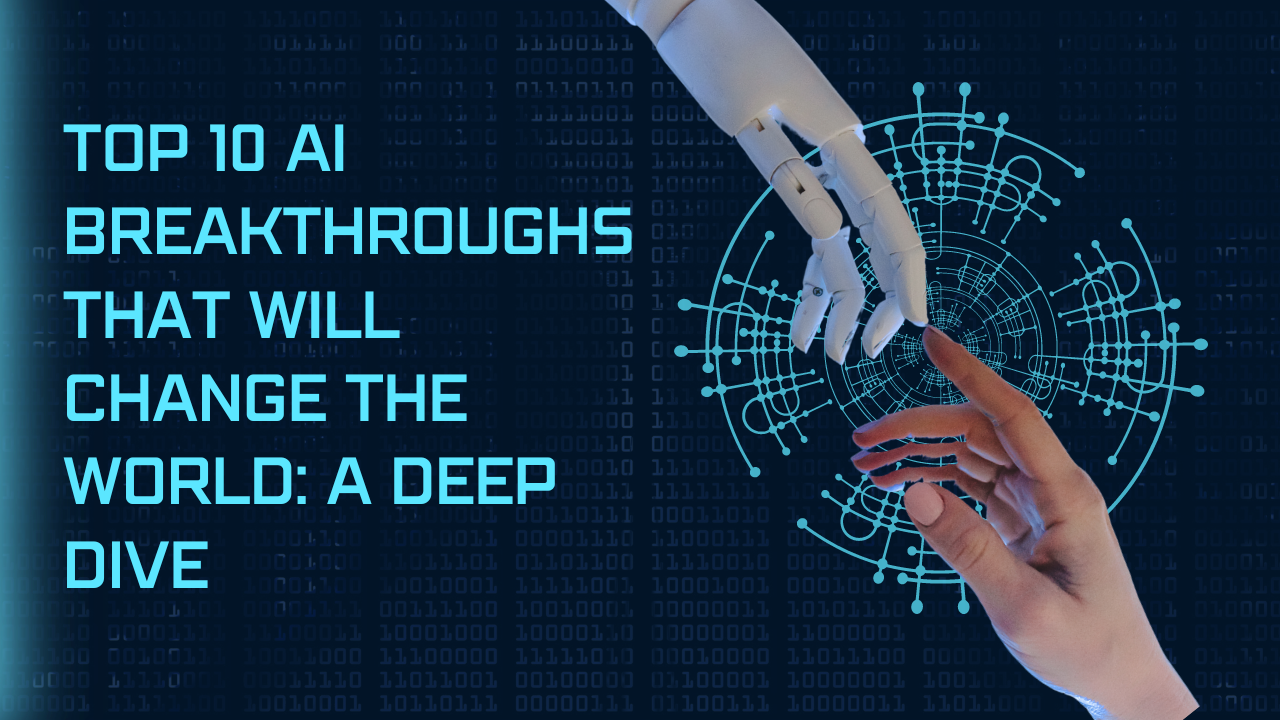Table of Contents
Imagine a world where diseases are diagnosed before symptoms even appear, where traffic jams are a distant memory, and where language barriers dissolve into thin air. This may sound like a futuristic utopia, but the truth is, we’re closer to this reality than you might think. Artificial Intelligence (AI) is rapidly transforming our world, and the breakthroughs happening today are nothing short of extraordinary.
From revolutionizing healthcare to optimizing agriculture, AI is penetrating every aspect of our lives, promising to make the world a better, more efficient, and more sustainable place. In this comprehensive article, we’ll take a deep dive into the top 10 AI breakthroughs that are poised to change the world as we know it.
1. AI in Healthcare: Revolutionizing Diagnosis and Treatment

Think of a world where diseases are caught before they even manifest symptoms, where treatments are tailored to your unique genetic makeup, and where the risk of adverse side effects is minimized. This is the transformative power of AI in healthcare.
AI-powered algorithms can analyze medical images with an accuracy that surpasses human experts. For instance, AI can detect cancerous cells in mammograms with a staggering 99% accuracy rate, enabling earlier diagnosis and potentially saving countless lives.
But AI’s impact goes beyond diagnosis. By analyzing a patient’s genetic data, medical history, and lifestyle factors, AI can predict how they will respond to different treatments. This personalized approach to medicine ensures that patients receive the most effective therapies while minimizing the risk of adverse side effects.
As AI continues to advance, we can envision a future where healthcare is truly personalized, where diseases are caught early, and where treatments are tailored to the individual – a future where healthcare is more effective, accessible, and affordable for everyone.
2. Autonomous Vehicles: The Future of Transportation

Picture this: you step into your self-driving car, and it whisks you away to your destination while you catch up on work, read a book, or simply enjoy the scenery. No more traffic jams, no more road rage, and no more accidents caused by human error.
This is the future of transportation, and it’s being powered by AI.
Autonomous vehicles, equipped with sophisticated AI algorithms, can navigate complex environments, react to changing conditions, and make split-second decisions – all while ensuring the safety of passengers and pedestrians.
Beyond convenience, self-driving cars have the potential to transform our cities, reduce emissions, and make transportation more accessible for everyone. Imagine a world where traffic flows smoothly, where parking spaces are no longer a scarce commodity, and where the elderly and those with disabilities can move freely.
As we embrace this revolution in mobility, we’re not just transforming transportation; we’re creating a safer, more sustainable, and more inclusive world.
3. AI in Climate Change Mitigation

The fight against climate change is one of the greatest challenges of our time, and AI is emerging as a powerful ally in this battle. By harnessing the power of AI, we can gain a deeper understanding of our planet and develop more effective strategies to mitigate the impact of global warming.
AI algorithms can analyze vast amounts of data from satellites, sensors, and climate models, enabling us to predict weather patterns, track deforestation, and identify areas at risk of wildfires or other environmental disasters.
Moreover, AI can optimize energy consumption, helping us transition to renewable sources and reducing our carbon footprint. Imagine AI-powered smart grids that can automatically adjust energy usage based on demand, or AI-designed sustainable buildings that minimize energy waste.
As we continue to explore the potential of AI in climate change mitigation, we’re not just protecting our planet; we’re safeguarding the future of generations to come.
4. AI in Creativity: Unlocking New Avenues for Art and Music

When we think of AI, we often picture advanced algorithms and complex calculations. But what if AI could also unlock the depths of human creativity? Believe it or not, AI is already pushing the boundaries of artistic expression, revolutionizing the way we create and experience art and music.
Imagine an AI that can compose a symphonic masterpiece that evokes the emotions of a summer sunset or generate a painting that captures the essence of a dream. AI-powered tools are already assisting artists in their creative endeavors, offering new perspectives and inspiring novel forms of artistic expression.
From AI-generated poetry that tugs at the heartstrings to AI-composed music that transcends genres, the possibilities are endless. As we embrace AI in the realm of creativity, we’re not just expanding the horizons of human imagination; we’re redefining what it means to be an artist.
5. AI in Education: Personalized Learning for Every Student

Every student learns differently, and a one-size-fits-all approach to education often leaves some students behind. But what if we could tailor the learning experience to each individual’s needs and strengths?
AI-powered educational platforms are making personalized learning a reality. By analyzing student performance data, AI can identify areas where a student needs additional support and provide customized instruction and learning materials.
Imagine a world where every student has a personalized learning plan that adapts to their strengths, weaknesses, and learning styles. This personalized approach not only improves academic outcomes but also fosters a love of learning and builds confidence in students.
As AI continues to revolutionize education, we’re not just improving test scores; we’re empowering students to reach their full potential and shaping the minds of tomorrow’s leaders.
6. AI in Agriculture: Optimizing Crop Yields and Resource Management

With a growing global population and increasing pressure on our natural resources, sustainable agriculture has never been more crucial. And AI is playing a pivotal role in optimizing crop yields, managing resources efficiently, and detecting diseases early.
AI-powered robots can automate planting, harvesting, and monitoring tasks, increasing productivity and reducing waste. But that’s just the beginning. AI can analyze soil conditions, weather patterns, and crop data to optimize irrigation, fertilization, and pest control, minimizing the environmental impact of agriculture.
Imagine a future where AI helps us produce more food with fewer resources, ensuring food security for a growing population while protecting the environment for generations to come.
As we embrace AI in agriculture, we’re not just revolutionizing the way we grow our food; we’re paving the way for a more sustainable and resilient future.
7. AI in Language Translation: Breaking Down Communication Barriers

In a world that’s becoming increasingly interconnected, language barriers can hinder global collaboration and understanding. But what if we could communicate seamlessly, regardless of our native tongues?
AI-powered language translation tools are breaking down these barriers, enabling real-time communication between people from different cultures and backgrounds. Imagine being able to converse with someone from across the globe as if you were both speaking the same language.
From business negotiations to cultural exchanges, AI-powered translation is fostering greater understanding and cooperation among diverse communities. As we continue to embrace this technology, we’re not just breaking down language barriers; we’re building bridges that connect people from all corners of the world.
8. AI in Cybersecurity: Protecting Against Threats

In our increasingly digital world, cybersecurity threats are becoming more sophisticated and widespread. From data breaches to malware attacks, the risks to our personal and professional information are ever-present.
However, AI is emerging as a powerful ally in the fight against cyber threats. AI-powered systems can detect and respond to threats in real time, preventing data breaches and safeguarding sensitive information.
Imagine a future where AI acts as a virtual bodyguard, constantly scanning for potential threats and adapting to new attack vectors before they can cause harm. As cyberattacks continue to evolve, AI will be crucial in staying ahead of the curve, protecting our data, our privacy, and our digital lives.
As we embrace AI in cybersecurity, we’re not just defending against threats; we’re fortifying the digital infrastructure that underpins our modern world.
9. AI in Customer Service: Revolutionizing Support and Interaction

In the age of instant gratification, customers expect fast, efficient, and personalized service. AI-powered chatbots and virtual assistants are revolutionizing the customer service landscape, providing instant support, answering queries, and resolving issues with remarkable efficiency.
Imagine being able to get your questions answered or problems resolved without ever having to wait on hold or navigate through a maze of automated menus. AI-powered customer service tools can understand natural language, analyze customer data, and provide tailored solutions, ensuring a seamless and satisfying experience.
But AI’s impact goes beyond just answering questions. By analyzing customer data, AI can personalize interactions, anticipate needs, and even offer proactive solutions before an issue arises. This level of personalization can help build stronger relationships with customers and foster brand loyalty.
As we embrace AI in customer service, we’re not just improving efficiency; we’re redefining the customer experience, creating a world where every interaction is tailored, every need is anticipated, and every customer feels truly valued.
10. AI in Scientific Research: Accelerating Breakthroughs

Scientific research is a realm where breakthroughs can change the course of human history, and AI is playing a pivotal role in accelerating these discoveries. By analyzing vast datasets and identifying patterns that even the most brilliant human minds might miss, AI is pushing the boundaries of what’s possible in fields like medicine, materials science, and energy production.
Imagine AI algorithms sifting through genetic data to identify potential drug targets for diseases like cancer and Alzheimer’s, significantly reducing the time and cost of developing new treatments. Or envision AI simulations that can test hypotheses and explore new materials with unprecedented speed and accuracy, paving the way for innovations in renewable energy or nanotechnology.
As we continue to harness the power of AI in scientific research, we’re not just accelerating the pace of discovery; we’re unlocking the secrets of the universe, one breakthrough at a time.
Conclusion
These are just a few examples of how AI breakthroughs are transforming our world, but the possibilities are truly endless. As AI continues to evolve, we can expect even more groundbreaking innovations that will shape the future in ways we can’t yet imagine.
However, as we embrace the power of AI, we must do so responsibly, with ethical considerations at the forefront. We must ensure that AI is developed and used in a way that benefits humanity as a whole, addressing concerns around privacy, security, and fairness.
By harnessing the power of AI for good, we can create a better future – a future where disease is conquered, sustainability is achieved, and human potential is unleashed. The AI revolution is upon us, and it’s up to us to shape it into a force for positive change, one breakthrough at a time.





